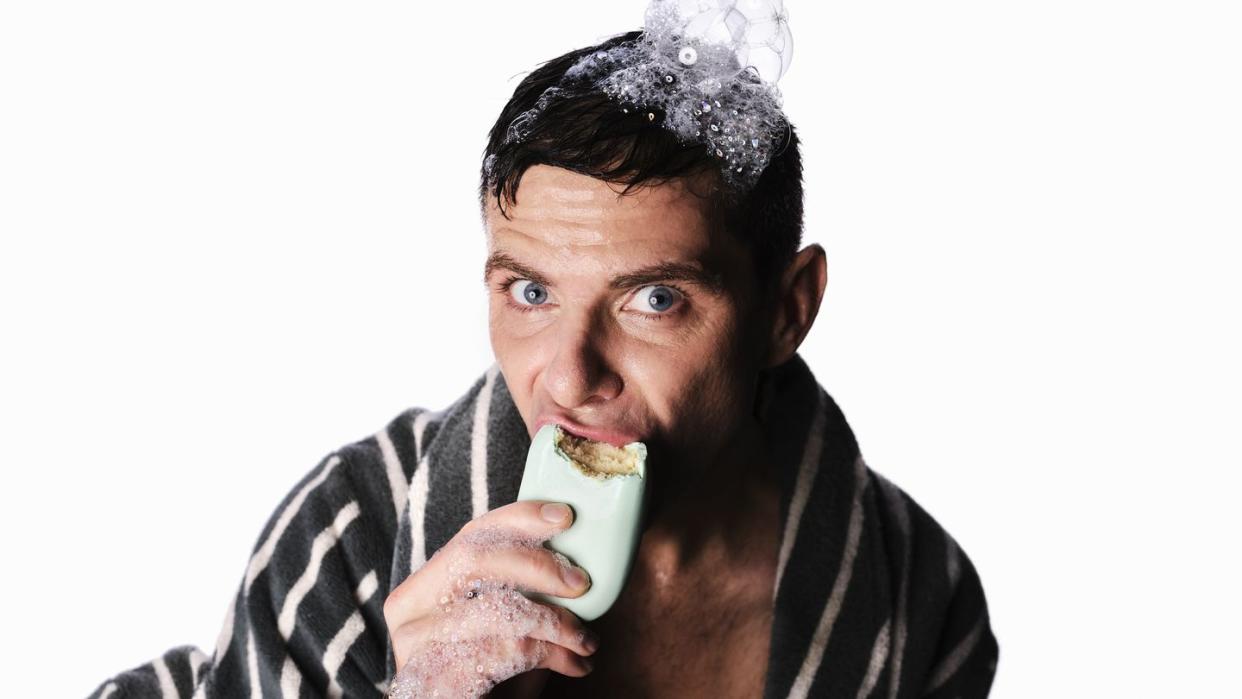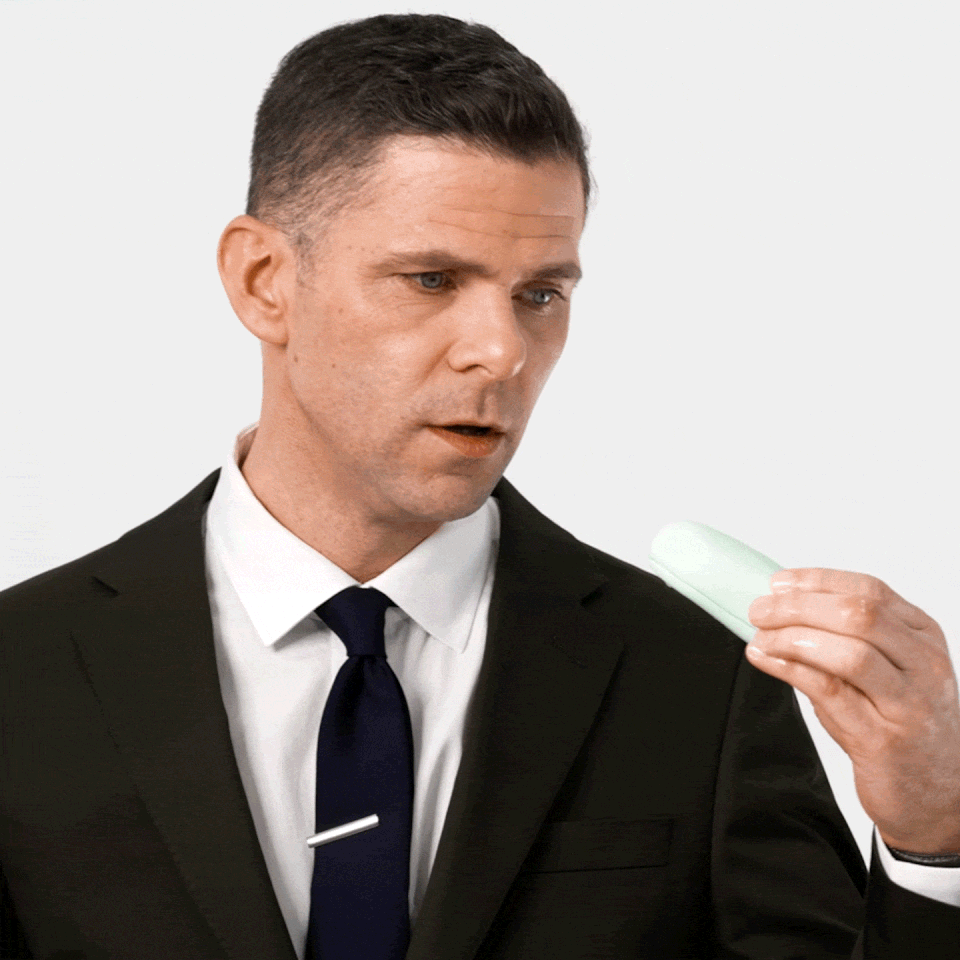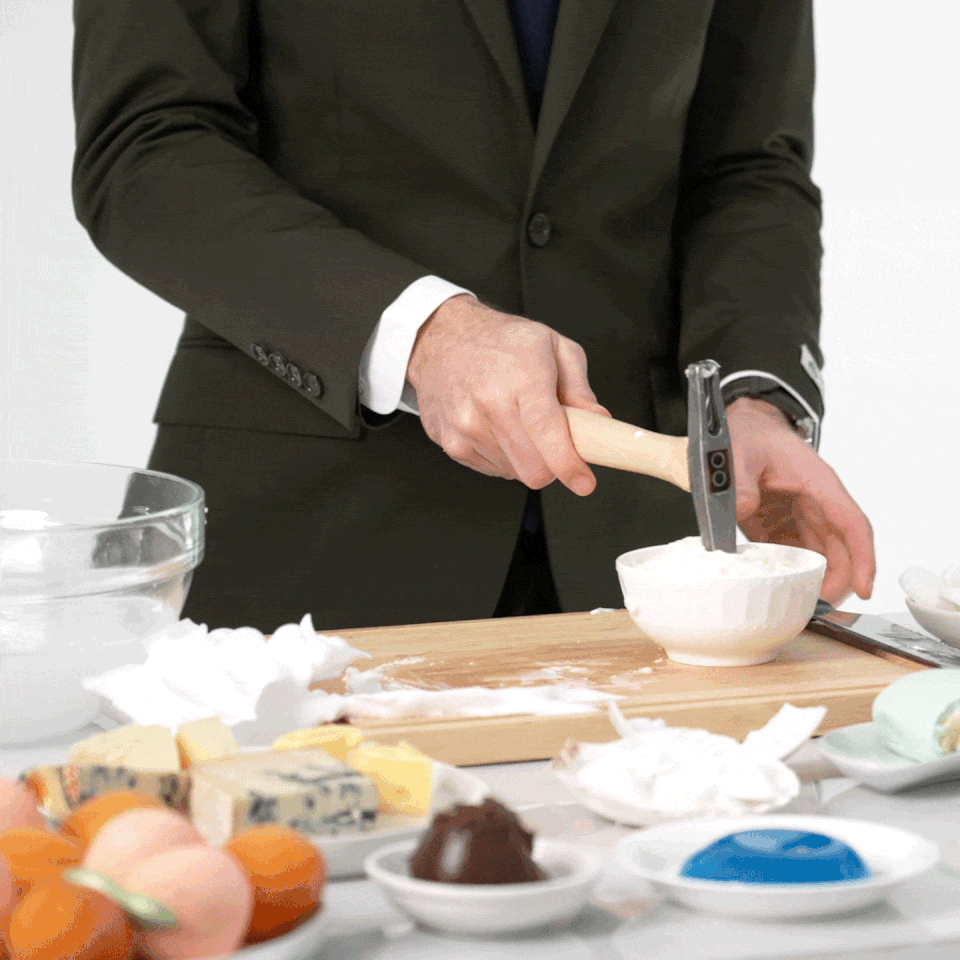Mikey Day's Bad Sketches Have Turned Him Into a Better Writer

- Oops!Something went wrong.Please try again later.
- Oops!Something went wrong.Please try again later.
This article was originally featured in MH Flex, our monthly newsletter recommending the one in-depth interview you need to flex your pop culture knowledge. Sign up here to get it first.
MIKEY DAY’S FIRST experience with inappropriate laughter was in third grade.
It was during a school play called Stone Soup, he says. While the details of the play are fuzzy (come on, he was nine), he remembers he had to drop a stone into a metal bowl. So he dropped it—hard. The rock clanged; the class laughed, even though they weren’t
supposed to.
Now 44 and a core cast member of Saturday Night Live, Day says he never forgot that feeling. Day actually joined SNL as a writer back in 2013; he toiled on the show from behind a desk, watching sketches he wrote land and flop. Then in 2016, David S. Pumpkins was born. As Day tells it, he came up with the idea of Tom Hanks as Pumpkins, a bizarro-world host of a haunted-elevator attraction, during a 4:00 a.m. writing session. The video currently has 24.8 million YouTube views. After Pumpkins blew up, Day started appearing in front of the camera more often.

And though he’s a regular on the show, Day hasn’t stopped writing for it, on top of his side hustle as the host of Netflix’s Is It Cake?, now in its third season. He says he’s at the point in his life “where you just got to try something, because you never know.”
Day’s strategy is simple: put out what he thinks is funny. Sometimes it’s a sketch about road rage based entirely on hand gestures (“Traffic Altercation,” season 48). Sometimes it’s a half-man, half-golden-retriever soldier (“New Military Weapon,” season 47). And, yes, sometimes it’s David S. Pumpkins (season 42).
But it’s always about dropping the rock—and a little louder than you’re supposed to.
Day sat down with Men's Health to talk about his earliest memories of making people laugh, learning what the audience likes, and the best joke he's ever told.
MEN'S HEALTH: When did you figure out you were funny?
MIKEY DAY: I knew I enjoyed making people laugh in elementary school. I remember doing a play in third grade called Stone Soup. I don't remember the mechanics of the whole play, but I remember at one point dropping a stone into a loud metal bowl, and it clanged, and the class laughed. I guess it was a formative moment, because I still remember it vividly. But I remember thinking, 'Oh, that's fun. I want to do more of this.'
I also remember playing handball in elementary school. Handball was the cool thing to do at my school during recess. This ages me and dates me, but there was a show after America's Funniest Home Videos called America's Funniest People, hosted by Dave Coulier (Joey of Full House fame). I remember quoting bits from that and people were laughing. I liked this girl, and I remember her friends coming up and being like, 'Ashley has a crush on you,' and I'm like, 'Just because I was crushing it on the handball court with my impressions.'
Those are two early moments I remember enjoying making people laugh.
MH: Where did you think comedy would take you? Was there a pre-established map in your mind to follow?
MD: Growing up, Saturday Night Live was a big deal. I remember taping it—again, dating myself—on a VCR. 'What's a VCR?,' several people reading this are probably wondering right now.
But, it always seemed so far away and so unattainable. How would you even do that? Rather than a concrete goal, I always viewed SNL as, 'That would be cool,' but didn't want to set it as an official goal, because I didn't want to be disappointed. But SNL was always up there.
As I was being creative, and in the world of comedy, I was fulfilled and happy. I was pretty young when I started at Groundlings—19. [It] was an awesome experience, because you're just writing comedic material and putting on shows; I was very fulfilled for a while. Then gradually, when SNL happened, it was surreal and fantastic, because that's the pinnacle. Especially growing up, that was the place, the show.
MH: Did you have any type of fallback plan at all?
MD: I remember thinking, 'Oh, maybe I could do advertising,' and actually took this advertising course in college. I only lasted a couple classes, not because I didn't enjoy it, but simply because I was at UCLA and the class was in Torrance. It isn't that far away, but for me and my 21-year-old mindset, I was like, 'This is too far.' So performing, and writing especially, was always my main goal. Pursue it by any means necessary.
MH: You've been writing and performing on SNL for a decade now. What’s your trick to avoid going stale?
MD: I feel like SNL is engineered to save my A.D.D., because it's so week-by-week. You're working, producing the piece all week, and then you do it on Saturday, and then you literally brush it all away. Then it's all about the next week.
You can write something, it'll get selected to get produced and go to dress rehearsal, and then if it starts bombing, you're immediately thinking, 'This was a bad idea, why did I do this?' But in the few days leading up to it, you can be so into it, and you're just like, 'I'm excited. Here we go. Let's go.' Really, the schedule's engineered in a way where I feel like getting stale isn't part of the equation.
MH: Have you honed in on your own strengths and weaknesses as a comedian?
MD: I love to write, and sometimes I feel like a particular host can inspire you in a certain way. But at the same time, I'm learning every week what an audience likes.
Plus, there are different generations, and each audience at SNL will have a mix of younger and older people. So you're really learning what younger audiences respond to versus what my generation and above respond to; I wish I had the secret recipe. That's what we're always saying at work. If there was some concrete mathematical formula, it would be fantastic. But there never is.
MH: You’re with your fellow cast members a lot. Do you feel the bonds you form happen more on set, or is it the things that happen off-set that strengthen your relationships?
MD: I think it's mostly off-set. Performing together and being on set is definitely part of it, but it's funny how being on that show really bonds you. Just the nature of the show, and how hard you're working—there are late hours sometimes, and sometimes you'll be on a pre-tape set together for a long time in a crazy outfit, and sometimes your outfits will be painful. I had to wear some armor once, and I just remember it being heavy.
The first week will feel like the very first day of school, because sometimes there's a lot of new cast members. Then, after two weeks, you feel like you've known them for years. It's just the nature of the show. It's pretty great.
MH: Is it refreshing to take that heavy armor off and wear whatever you want? Or do you like jumping in and out of different costumes on the fly?
MD: Well, I've always been comfortable first. But it's interesting, because I've always loved Halloween. But you're just so used to being in crazy costumes, and some of the best people in the world help you with your look on all sides, from the costume, to the makeup, to the hair. Sometimes on Halloween I'll want to dress up, and I lack the motivation because I'm like, 'Well, two days ago I was in an insane outfit dressed like a robot. I don't know. Should I dress up?'
MH: It's Halloween every Saturday.
MD: Exactly. It's Halloween every Saturday.
MH: How long did it take to create a good work-life balance?
MD: It's all about time management. I'm personally really bad at [that], so I'll get there on a Tuesday for writing day/night, and will stay overnight into Wednesday, which is the table read day, simply because I feel like my body chemistry has trained itself to be like, 'Okay, it's midnight on Tuesday—now it's time to buckle down and write through the night.'
But a lot of people can go home. Responsible, normal adults can go home at a reasonable hour on Tuesday. But it varies, too. You could have a really busy week one week, and be in the pre-tapes on Friday, and don't have a lot of time. Or you can have a light week, and you're going in on Thursday. You could have a 5 p.m. call time, so you have that day. It all depends, week to week.
It's funny—sometimes on Tuesday my son will be like, 'Okay, see you Thursday.' He'll know.
MH: Have you ever been in full delusion at 2 a.m., threw words down, and ended up putting together one of your proudest sketches?
MD: That definitely happened with a few. My first season, I wrote a sketch with Tom Hanks as David Pumpkins, which became one of my most well-known sketches. That was a late night, 4 a.m., 'What is this? I hope people aren't confused by it.' I guess David Pumpkins is inherently confusing within the sketch. I've often done things super late that turn out to be great pieces, and I’ve also written things at 4 a.m. that turn out to be really bad as well. You never know. I've had enough successes and failures to where you just have to try something, because you never know.
MH: Is there a particular way that the cast has been instructed to handle controversial topics—especially when it comes to politics?
MD: Lorne [Michaels] has always said the show is "An equal opportunity offender." You can go after both sides. I think the beauty of it is that you can write whatever you want from whatever point of view you want, as long as it's not insane or offensive. I just write what I want to write. I write a lot of the dumb stuff, and leave the political stuff in the hands of the head writers and others.
MH: If Lorne ever decides to step down, is there a particular direction you would like to see SNL go in under new guidance?
MD: I can't imagine the show without Lorne. It's so weird. Even thinking about that question, I'm like, 'No.' They're synonymous, the show and Lorne. He brings this class to the whole thing. So, I can't imagine it. I can't theorize. I just hope he will stay forever.
MH: Does a sketch bombing actually teach you anything? What have you learned from that kind of experience?
MD: Just that shorter is better. Sometimes it's easy when you're looking at the page to be like, 'I don't know what to cut. All these jokes are amazing.' Then you're in practice, you're seeing it, and you're like, 'Oh, this should be way shorter.' No one's ever like, 'Oh, I wish...' It's better to have people wish something was longer than people saying, 'Oh, it was funny but it went on too long." Shorter is always better.
MH: What's the best joke you've ever told?
MD: Oh my gosh.
MH: That one joke that’s on repeat, that you tell the same people. Your go-to whenever you’re in a new group.
MD: That's nearly impossible. There are so many. I know whatever I respond, I'm going to think, 'Oh, why did I say that and not this?'
This isn't the best joke ever, but I learned it as a kid and used to do it all the time: 'Did you hear the memory joke? Oh, sorry. I forgot.' I remember thinking that was so funny. It's certainly not the best joke, and I'm not saying that as an adult in social situations, but that's all I can think of now. I apologize that I went with the memory thing—that's an old joke that was in 100 Jokes for Kids.
MH: Page 27, just waiting there.
MD: Exactly.
This interview has been condensed for content and clarity.

RAPID FIRE
Go-to cologne in high school?
Drakkar Noir, baby.
Most traumatic manscaping experience?
Can’t comment. Mom might read this.
Longest you’ve ever gone without a shower?
No comment. Wife might read this.
One style trend you want to come back?
Seth Green’s character’s fashion in Can’t Hardly Wait.
What’s your splurge-worthy grooming product?
Good shaving gel.
Favorite item in your closet?
Short Circuit T-shirt.
Styling: Ted Stafford.
Prop styling: Andrea Bonin.
Hair: Yu Nakata.
Makeup: Evy Drew.
Director/Executive Producer, video: Dorenna Newton.
Editor, video: Josh Archer.
You Might Also Like

